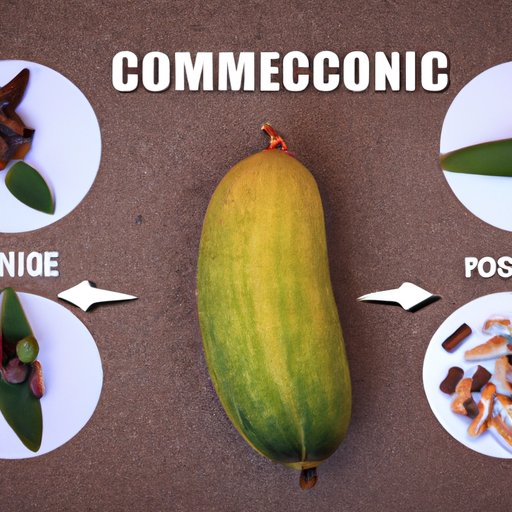
Introduction
Constipation can be characterized by infrequent bowel movements, discomfort, and difficulty when passing stool. While it can be a common issue, experiencing it on a regular basis can be uncomfortable, painful, and lead to other health concerns. In this article, we will explore natural remedies, over the counter medications, dietary and lifestyle changes, and when to consider medical treatment for constipation.
5 Natural Remedies for Constipation Relief
When experiencing constipation, natural remedies can be a great way to alleviate symptoms without experiencing unwanted side effects from chemicals. Here are five natural remedies:
Fiber
Eating high-fiber foods like vegetables, fruits, and grains can soften stool and promote bowel movement. It is recommended that an adult should consume between 25-30 grams of fiber daily. Examples of fiber-rich foods include raspberries, chia seeds, whole grains, lentils, and broccoli.
Probiotics
Probiotics can help promote gut health by enhancing the growth of beneficial bacteria that aid in bowel movements. Fermented foods like yogurt, kimchi, kefir, and sauerkraut are good sources of probiotics.
Herbs and Supplements
Herbs like senna, aloe, and cascara sagrada have been traditionally used to alleviate constipation symptoms. Magnesium supplements can also help relax intestinal muscles, and aid in bowel movements. However, it is important to consult with a healthcare provider before taking any supplements.
Hydration
Adequate hydration is essential for healthy bowel movements. Drinking water and other fluids can help soften the stool and facilitate its movement through the intestines. It is recommended that an adult should drink between 8-10 cups of water daily.
Exercise
Exercise can promote bowel movements by enhancing muscle contraction of the intestine and promoting blood flow to the digestive system. Regular physical activities like cycling, walking, jogging, and yoga can help alleviate constipation symptoms.
Over-the-Counter Medications for Constipation Relief
If natural remedies are not effective, over the counter (OTC) medications can be an option. Here are some commonly used OTC medications:
Stool Softeners
Stool softeners like Colace and Docusate can help soften the stool by drawing water into the colon, making it easier to pass.
Laxatives
Laxatives like Polyethylene glycol (Miralax) and Bisacodyl can help promote bowel movements by stimulating intestinal muscles and increasing water secretion into the intestines. However, excessive use of laxatives can lead to dehydration and diarrhea, and may cause the body to become dependent on them.
Dietary Changes to Help with Constipation
One of the main causes of constipation is a diet that is low in fiber. Here are some dietary changes that can help alleviate constipation symptoms:
Fiber and Water Intake
It is recommended that an adult should consume between 25-30 grams of fiber daily. Foods like whole grains, fruits, and vegetables are good sources of fiber. Drinking enough water is also equally important, especially when increasing fiber intake because water helps fiber draw fluid into the colon.
Foods to Include in Diet
Prunes, beans, berries, figs, avocados, nuts, and whole grains are excellent sources of fiber that can help alleviate constipation symptoms.
Foods to Avoid in Diet
Foods that are high in fat, processed foods, and dairy products are some foods that can lead to constipation. Limiting intake or avoiding these foods can help alleviate symptoms.
Lifestyle Changes to Alleviate Constipation
Aside from dietary changes, there are other lifestyle habits that can help alleviate constipation:
Regular Exercise
Regular exercise can help alleviate constipation symptoms by promoting blood flow to the digestive system. You do not have to do extreme workouts, but gentle exercises like walking, cycling, and yoga can be effective.
Adequate Sleep
Adequate sleep is essential for maintaining a healthy gut, as sleep deprivation can disrupt bowel movements. Getting enough sleep every night can help reduce the risk of constipation.
Stress Management Techniques
Reducing stress can aid in bowel movement regulation. You can use techniques like meditation, deep breathing exercises, or yoga to help manage stress and alleviate constipation symptoms.
When to Consider Medical Treatment for Constipation
Even with the aforementioned natural remedies, dietary changes and lifestyle modifications, some people may still experience prolonged constipation. This, in turn, may lead to other health problems. In such cases, medical intervention may be required. Here are some signs that indicate when to consider medical treatment:
Red Flags
Being unable to pass stool for more than a week
Bloating and abdominal pain
Blood in the stool
Health Risks
Chronic constipation can increase the risk of hemorrhoids, anal fissures, and rectal prolapse. In severe cases, it may even cause fecal impaction and require surgical removal.
Medical Treatment Options
Prescription medications like Lubiprostone, Linaclotide, and Prucalopride can help alleviate constipation symptoms. Enemas or suppositories may also be prescribed when other treatment options fail.
Conclusion
Constipation can be uncomfortable, but it is often preventable and treatable. Incorporating adequate fiber and hydration in your diet, regular exercise, and reducing stress can help alleviate symptoms without medication. However, if natural remedies and dietary and lifestyle modifications do not provide relief and you experience persistent or severe constipation, it’s time to consult a physician.





